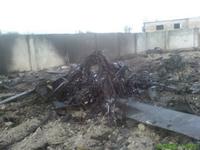-
Sector Report for Friday, 19 August 2011: State / Local
This report contains the following stories.
Plus 5 additional stories
-
-
Purdue helps Chicago prepare for disasters
To be better prepared for a major natural disaster or a terrorist attack, seventeen counties near Chicago, Illinois have banded together to create a disaster preparedness plan with the help of Purdue University and the University of Illinois, Chicago
-
-
Phoenix police banned from sporting tattoos

In an effort to present a more professional image, an increasing number of police departments across the United States are requiring officers to cover up their tattoos; the Phoenix police department recently began requiring its officers to cover its tattoos, a move that has generated criticism due to the intense Arizona heat
-
-
U.S., Canada to share hazard risk assessment software tool
Hazus, or “Hazards U.S.” is a risk assessment software tool for emergency management professionals that combines science, engineering, and geospatial information technology to estimate potential loss of life and property damage from disasters and natural hazards; FEMA is using it and now Canada will, too
-
-
DHS unveils new terrorism awareness ads
DHS secretary Janet Napolitano unveiled new television ads Wednesday for the public awareness campaign “If you see something, say something”; Napolitano said the videos are not intended to be alarmist, nor do they suggest only a vague threat, as did the security alert “color code” of years past
-
-
DHS cracks down on sham universities

DHS officials are cracking down on sham universities that make millions of dollars by preying on foreign students, especially those from India, with promises of student visas; in January, officials shut down Tri-Valley University in California on suspicion of visa fraud, mail fraud, wire fraud, and money laundering; officials believe that the university made millions of dollars by giving foreign nationals illegally obtained student visas
-
-
Arkansas farmers and ranchers crippled by natural disasters
This year’s series of natural disasters have crippled Arkansas’ farming and ranching sectors; the barrage of natural disasters including floods, droughts, and fires have resulted in more than half a billion dollars in losses for farmers in Arkansas
-
-
Pakistan likely let China examine U.S. stealth helo

U.S. intelligence officials believe that Pakistan’s intelligence service allowed Chinese military engineers to examine the wreckage of a new stealth helicopter used in the raid that killed Osama bin Laden; the helicopter was damaged in the assault on bin Laden’s compound in Abbottabad, Pakistan in May and Navy SEALs were forced to leave it behind
-
-
Bill calls for all utility plant worker background checks
Senator Charles Schumer (D-New York) will introduce new legislation that would require all major utility plants to run background checks on its employees; the bill would require FBI background checks on all employees of all major utility plants, strengthening the current requirement which mandates such checks only at nuclear power plants
-
-
Mississippi schools consider fingerprint scanners
A school district in Mississippi is considering installing biometric fingerprint scanners at its cafeterias to identify students; Tupelo School District officials are currently debating a proposal to use biometrics instead of the existing system which relies on student ID numbers for meals; one official argues that the new system would make lines flow more quickly and ultimately contribute to increased student performance
-
-
New task force helps protect Port of Virginia
A new border security task force has been launched to help secure the Port of Virginia; the task force is comprised of ten officers and agents from a total of ten local, state, and federal agencies that will be responsible for securing the Port of Virginia against a variety of criminal acts including trade fraud, cargo theft, and the illegal smuggling of drugs, persons, currency, and weapons
-
-
DHS's new terrorist database rankles privacy groups

A new DHS plan to create its own version of the FBI’s terrorist watch list that is exempt from the Privacy Act has privacy groups concerned; under the proposed plan, DHS would create the Watchlist Service which would bring the FBI’s suspected terrorist list in-house and expand on it
-
-
Dallas launches regional nuke detectors
The Dallas police will soon be participating in a regional radiological nuclear detection program that will help law enforcement officials detect any anomalies and help protect against any nuclear or radiological attacks
-
-
U.K. police procurement hub goes live
The U.K. launches a new, Amazon-style online procurement process which enables police forces to buy specified goods and services online; all forty-three U.K. police forces are expected to be using the hub by June 2012
-
-
Senator Schumer targets fake IDs from China
Fake IDs have long been a problem for law enforcement agencies, but the recent discovery of counterfeit IDs from China that appear nearly identical to the real thing have lawmakers particularly concerned
-
More headlines
The long view
Factories First: Winning the Drone War Before It Starts
Wars are won by factories before they are won on the battlefield,Martin C. Feldmann writes, noting that the United States lacks the manufacturing depth for the coming drone age. Rectifying this situation “will take far more than procurement tweaks,” Feldmann writes. “It demands a national-level, wartime-scale industrial mobilization.”
No Nation Is an Island: The Dangers of Modern U.S. Isolationism
The resurgence of isolationist sentiment in American politics is understandable but misguided. While the desire to refocus on domestic renewal is justified, retreating from the world will not bring the security, prosperity, or sovereignty that its proponents promise. On the contrary, it invites instability, diminishes U.S. influence, and erodes the democratic order the U.S. helped forge.
Fragmented by Design: USAID’s Dismantling and the Future of American Foreign Aid
The Trump administration launched an aggressive restructuring of U.S. foreign aid, effectively dismantling the United States Agency for International Development (USAID). The humanitarian and geopolitical fallout of the demise of USAID includes shuttered clinics, destroyed food aid, and China’s growing influence in the global south. This new era of American soft power will determine how, and whether, the U.S. continues to lead in global development.
Water Wars: A Historic Agreement Between Mexico and US Is Ramping Up Border Tension
As climate change drives rising temperatures and changes in rainfall, Mexico and the US are in the middle of a conflict over water, putting an additional strain on their relationship. Partly due to constant droughts, Mexico has struggled to maintain its water deliveries for much of the last 25 years, deliveries to which it is obligated by a 1944 water-sharing agreement between the two countries.
How Disastrous Was the Trump-Putin Meeting?
In Alaska, Trump got played by Putin. Therefore, Steven Pifer writes, the European leaders and Zelensky have to “diplomatically offer suggestions to walk Trump back from a position that he does not appear to understand would be bad for Ukraine, bad for Europe, and bad for American interests. And they have to do so without setting off an explosion that could disrupt U.S.-Ukrainian and U.S.-European relations—all to the delight of Putin and the Kremlin.”
How Male Grievance Fuels Radicalization and Extremist Violence
Social extremism is evolving in reach and form. While traditional racial supremacy ideologies remain, contemporary movements are now often fueled by something more personal and emotionally resonant: male grievance.
